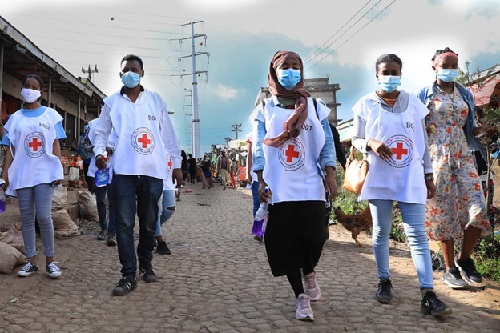
BY MENGISTEAB TESHOME
The ethos of volunteerism is infused with values such as solidarity, reciprocity, mutual trust, belonging and empowerment, all of which contribute significantly to quality of life.
Volunteers are motivated by values like those of justice, equality and freedom as expressed in the United Nations Charter. A society which supports and encourages different forms of volunteering is likely to be a society which also promotes the well-being of its citizens.
Report confirms that more than one billion people volunteer globally, the majority of them serving in their own countries. Many are in the forefront of efforts to improve the way they and their fellow citizens are governed and engaged. Moreover, volunteers are playing a vital role in making governments worldwide more accountable and responsive to their citizens.
In Ethiopia, traditional volunteerism is practiced in the form of debbo, jiggi, or any other form of collective self-help practices. Volunteerism also is manifested in burial and wedding ceremonies which in many cases require quite a number of free labor forces. The practice is also manifested in all forms of social ranks, age groups, as well as professional association.
The central point of volunteerism is promoting the core values of humanity. As volunteerism among the community is a basic expression of human relationships, nurturing and strengthening the culture among the young people should be well managed. Academicians strongly believe that the social relationships intrinsic to volunteer work are critical to individual and community well-being.
According to Mulatu Gebremariam, a sociologist, cultivating the culture of volunteerism among the people pays off. To ensure productive results, mobilizing the youth associations towards voluntary services is a remedy as well as positive action that can be taken as a means to accelerate the level of voluntarism in Ethiopia.
To ensure participation, it is very important to organize age desegregated voluntary service from primary level up to institutes of higher learning in the country.
He further noted that voluntary associations in various respective professions should be established with necessary gender, profession and vocation mix so that services they deliver to communities could be diverse and extended.
Abebe Chernet Addis Ababa City Government Education Bureau Communication and Public Relations Director for his part noted that voluntarism is educative in the sense that it further expands the outlook of the youths about the world and is very important for the promotion of democratic citizens based on unity of purpose and vision. Voluntarism is based on accommodating diversity of views and ways of life among the youth.
Volunteerism should be organized as a learning forum and career development for the youths. The volunteers should be able to link their academic or vocational training knowledge with practical activities that would help them to solve upcoming problems in their real life.
Participants can benefit a lot by learning from the local knowledge and wisdom of the most experienced members of the communities in which they participate, no matter how long they are expected to stay in the communities.
Respect for the moral values and cultures of communities in which they provide their services is very important to promote unity and peace whatever the size of the communities could be. Maintaining the highest level of discipline and punctuality on daily duties is an important component in daily activities of voluntary services.
People engage in volunteerism for a great variety of reasons: to eliminate poverty, improve basic health and education, provide safe water supply and adequate sanitation, tackle environmental issues and climate change, reduce the risk of disasters or to combat social exclusion and violent conflict. In all of these fields, volunteerism makes a specific contribution by promoting well-being for their own people and communities.
Volunteerism also forms the backbone of many national and international non-governmental organizations and other civil society organizations, as well as social and political movements. It is present in the public sector and is increasingly a feature of the private sector.
The Bureau along with pertinent stakeholders is looking for ways to engage higher education students and teachers in volunteer activities like tutoring lower graders, cleaning and planting seedlings among others. “We are working to strengthen the value of volunteerism to enshrine among the education system and beyond.”
According to various documents, where mainstream economics fosters values of self-interest and competition to achieve maximum satisfaction, a focus on well-being finds greater reason to value compassion and cooperation, both core values of volunteerism. The discourse on quality of life and well-being, and its place in the evolving development paradigm, must recognize the solidarity and reciprocal values of volunteerism as part of the dynamics that enhance human wellbeing.
A healthy society is one in which importance is given to formal and informal relationships that facilitate interaction and engagement and thus engender a sense of belonging. It is also one in which there is broad participation by all sections of the population. Communities with these characteristics do better in moving forward to meet common aspirations.
Volunteerism, in this regard, is more likely to develop civic skills, to attach more importance to serving the public interest as a personal life goal; and to be more politically active. What is more, it helps to build strong attachment with the community, and develop sense of purpose, expand social network and increases social skills for individual volunteers
Finally, as participants buckle up efforts in volunteerism activities the cumulative outcome contributes to a social environment that nurtures the well-being of all.
The Ethiopian Herald June 26/2022





